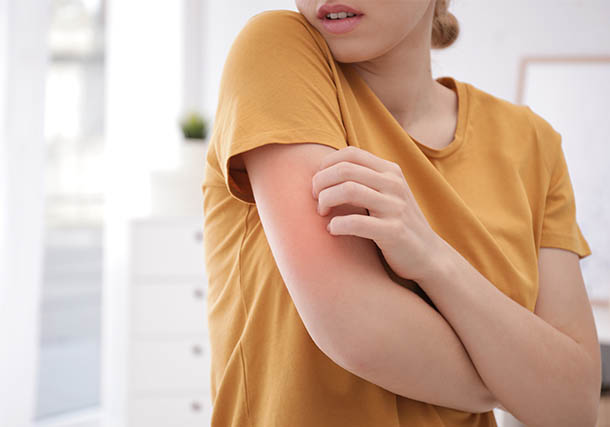
Allergic Dermatitis Treatment in Charlotte
Allergic dermatitis can be a frustrating and inconvenient condition for many individuals, especially when symptoms affecting the skin begin to draw your attention away from your daily life. At Carolina Asthma & Allergy Center, we understand the impact that allergic dermatitis can have on your lifestyle and well-being, and we are committed to providing comprehensive care to help manage and treat this condition.
Our team of board-certified allergists and experienced healthcare professionals is dedicated to providing personalized treatment plans and ongoing support to help you live your life to the fullest. Whether you are seeking a diagnosis, treatment, or ongoing management of your allergic dermatitis so you can find relief from your symptoms, we are here to help you every step of the way.
How to Request an Appointment
At Carolina Asthma and Allergy Center, we offer comprehensive evaluation and treatment for allergic dermatitis. If you suspect you may have allergic dermatitis or have experienced symptoms that specifically affect the skin, you can request an appointment with our team of board-certified allergists and experienced healthcare professionals.
To schedule an appointment, you can call our office or fill out the online appointment request form on our website. Our friendly staff will work with you to find a convenient date and time for your visit.
During your appointment, our allergists will review your medical history, perform a physical exam, and conduct any necessary tests to determine if you have allergic dermatitis. Based on your evaluation, our team will develop a personalized treatment plan to help manage your symptoms and prevent future allergic reactions.
What is Allergic Dermatitis?
Everyone’s skin gets irritated from time to time. But when you consistently experience redness, itching, burning, blistering, and other symptoms that affect your daily life, you may have an allergic skin condition. The most common allergic skin conditions include atopic dermatitis, contact dermatitis, urticaria (hives), and angioedema. All four can be incredibly uncomfortable and, in some cases, life-threatening.

Types of Allergic Dermatitis
An allergic skin condition occurs when your body interprets a substance – such as latex, perfume, or pet dander – as a threat. In response, the immune system releases histamine, causing allergy symptoms.
Generally speaking, there are four types of allergic skin conditions:
- Atopic Dermatitis
- Contact Dermatitis
- Urticaria (Hives)
- Angioedema
Atopic Dermatitis
Atopic dermatitis, also known as atopic eczema, is an inflammatory skin condition characterized by extremely dry, itchy rashes. Though this disorder is most common in young children, adolescents and adults can also develop symptoms.
The exact cause of atopic dermatitis is unclear. In some people, the condition is related to a gene variation. This variation affects the skin’s ability to retain moisture and ward off irritants. In other people, the condition is caused by too much bacteria on the skin.
What triggers atopic dermatitis can also vary. Some individuals experience flare-ups after consuming cow’s milk while others are affected by seasonal allergens like tree pollen.
Other common triggers include:
- Rough wool fabric
- Heat and sweat
- Stress
- Fragrances
- Household cleaning products
- Cigarette smoke
- Mold
- Pollen
- Pet dander
- Weather changes
Atopic dermatitis symptoms may include:
- Dry, cracked skin that may ooze or bleed
- Severe itchiness
- Red, raised patches of skin, especially in the folds of the knees and elbows
- Bacterial infections
Individuals with atopic dermatitis are also at risk of developing other autoimmune issues like asthma, allergic rhinitis, and food allergies.
Mild cases of atopic dermatitis can be treated with ointments and moisturizers. More severe cases are often addressed with prescription medications such as topical steroids and antihistamines.
Urticaria (Hives)
Urticaria, better known as hives, are swollen welts that suddenly appear on the skin. These raised patches are usually itchy. However, they tend to disappear within 24 hours.
Hives occur when histamine is released into the small blood vessels. Histamine causes the blood vessels to dilate and ooze fluid into the surrounding tissue. This causes swelling and itching.
Exactly what triggers the body to release histamine varies from emotional stress to the common cold. Other triggers include:
- Food allergies
- Medications (e.g., antibiotics, Aspirin, Ibuprofen)
- Cold or heat exposure
- Latex allergies
- Bacterial or viral infections
- Pet dander
- Pollen allergies
- Certain plants
- Insect stings or bite allergies
The welts associated with hives typically:
- Appear in clusters
- Are red, pink, or flesh-colored
- Range in size, from a pea to a dinner plate
- Itch, sting, or burn
- Change shape and location quickly
The center of a hive will also turn white when pressed, a phenomenon known as “blanching.” These welts tend to disappear within 24 hours. However, chronic hives can last for more than six weeks.
Cold compresses, topical ointments, and over-the-counter antihistamines are recommended for mild cases. For moderate to severe cases, medical professionals typically prescribe a corticosteroid or immune modulator, which works to either suppress or stimulate the immune system.
Angioedema
Angioedema refers to sudden swelling in the deeper layers of the skin. This reaction may occur with or without hives. It may also occur in combination with anaphylaxis, a potentially life-threatening condition that affects your ability to breathe.
Much like hives, angioedema is the result of a histamine response. This response is normally triggered by an allergen, such as:
- Pet dander
- Insect bites
- Food
- Medicines
- Pollen
- Mold
Angioedema can also be caused by certain autoimmune disorders like lupus.
The primary symptom of angioedema is sudden swelling. This swelling can happen anywhere in the body but often affects areas with loose connective tissue such as the face, extremities, and genitals.
Many people experience angioedema and hives simultaneously. Labored breathing caused by throat swelling (anaphylaxis) may also be present. The latter is life-threatening and requires immediate medical attention.
Mild cases of angioedema can be treated with cool compresses. For more severe, recurring cases of angioedema, providers may prescribe:
- Antihistamines
- Corticosteroids
- Epinephrine shots
- Inhaler medications to open the airways
How is Allergic Dermatitis Diagnosed?
The key to treating any allergic skin condition is to identify the allergen. A board-certified allergist can do this by conducting a series of minimally-invasive allergy tests, including:
- Skin prick test. During this procedure, the allergist lightly scratches your skin and applies a droplet of various allergens to the exposed skin. After 15 minutes, the allergist checks for signs of allergic reactions.
- Patch test. To conduct this test, the allergist places small amounts of allergens on your back. The allergen is then covered with a patch of tape. After 48 hours, the allergist removes the patches of tape and assesses for signs of a reaction.
- Blood test. A lab can also evaluate a blood sample for signs of allergies.
Prevention & Management of Allergic Dermatitis
Avoiding triggers is the best way to manage an allergic skin condition. If fragrances cause atopic dermatitis, you should use unscented detergents and soaps. Or, if wearing scratchy wool contributes to contact dermatitis, you should opt for softer fabrics.
Other ways to manage an allergic skin condition include:
- Identifying and treating underlying conditions. In many cases, skin conditions are symptoms of a deeper problem. Atopic dermatitis, for example, has been linked to irritable bowel syndrome, rheumatoid arthritis, and other autoimmune issues. Working with a primary care provider to address these systemic issues can improve your skin health.
- Implementing healthy lifestyle habits. Eating a well-balanced diet, exercising, reducing stress, drinking enough water, and limiting alcohol consumption can reduce skin inflammation.
- Adopting a skin-care routine. Regularly applying moisturizer to your skin can combat much of the dryness associated with conditions like atopic dermatitis.
Allergic Conjunctivitis Treatment in Charlotte
Atopic dermatitis and other allergic skin conditions can severely compromise your quality of life, causing distracting symptoms like itching, blistering, and burning. Treatment depends on the type of allergic dermatitis you have, and can vary from ointments and moisturizers to allergy shots. Our allergists, dieticians, and other board-certified specialists wll come up with a treatment plan customized to your lifestyle.
Summary
At Carolina Asthma and Allergy Center, we are dedicated to providing compassionate care and ongoing support to help you live your life to the fullest. Contact us today to request an appointment and take the first step towards managing your allergic dermatitis.
Allergic Dermatitis FAQs
Is there a link between eczema and asthma?
Yes. Both eczema and asthma, which are both inflammatory conditions. While not everyone with asthma has eczema, the opposite tends to be true: most children who have eczema will go on to develop asthma, too. Although no one knows for sure why these conditions are related, they’re likely both tied to environmental allergens.
What is the first sign of dermatitis?
The first sign of dermatitis, a form of eczema, is often the presence of red, dry, swollen skin or a rash. How – and when – the skin irritation forms depends upon the type of dermatitis. Atopic dermatitis usually begins in young children, and it has no specific trigger. Flare-ups occur from time to time and may continue into adulthood. Contact dermatitis, however, happens to people of all ages and is triggered by a particular substance. For irritant contact dermatitis, the triggering substance is often a toxic one, such as a chemical or disinfectant. For allergic contact dermatitis, the triggering occurs with an allergic response, such as to poison ivy, perfumes, dyes or metals.
Does dermatitis go away?
Sometimes. As like all forms of eczema, there is no cure for dermatitis. That does not mean, however, that people with dermatitis have to deal with the condition forever. About half of children will atopic dermatitis will grow out of the condition entirely. For others, effective treatments can manage the condition, and – in the case of contact dermatitis – identifying the trigger can reduce the change of future recurrences. With a variety of treatments for each type of dermatitis, there is no reason to suffer the effects of this condition. If you live in Charlotte and have dermatitis, call Carolina Asthma & Allergy to learn how we can help you relieve these symptoms.



